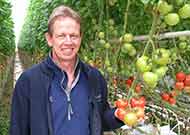
2013 Farmer of the Year Godfrey Dol
Godfrey Dol is Technical and Business Development Manager at Costa's 20 hectare glasshouse enterprise at Guyra which produces 12 million kilograms of tomatoes annually.
As technical manager, Godfrey plays a key role in achieving record yields through climate and water management, varietal selection, pest and disease management and biosecurity.
Water use efficiency at the facility is world leading with only 12.5 litres of irrigation water used to produce 1kg of tomatoes compared to 100-200 litres per kilo of field tomatoes.
The greenhouse recirculates one-third of its irrigation requirements and captures another third from the 20ha greenhouse roof. The recirculation of fertilised drain water has halved the fertiliser usage. Sensors that measure salt concentrations, temperature and water content have further increased the efficiency of water and fertiliser use.
Godfrey has also been heavily involved in developing of a CO2 mathematical efficiency model that has reduced CO2 emissions and increased yield. Heat used to control the climate in the glasshouse is generated by burning Propane - a clean energy source. The CO2 generated by burning propane is distributed into the glasshouse to reduce emissions and to increase production.
Due to the ability to control the temperature and humidity in a glasshouse and the protection the glass provides, pest and disease can be controlled much more efficiently. This reduces the need for pesticides and fungicides significantly. Even so, Godfrey and the management team are also developing an IPM program using predators for most insects to reduce populations further.
Godfrey, who has 30 years' experience managing successful glasshouse operations in the Middle East, North America as well as Australia, has been involved in other innovations at Guyra including:
- Testing new varieties for their suitability in the Australian climate and market by recording dozens of plant features and consumption characteristics of the fruit. The tests give a weekly score to the eating and taste features of each new variety.
- Research on greenhouse glass coatings to increase yields, effects of grafting on yield and quality and post-harvest improvements.
- The use of Automatically Guided Vehicles (AGV's) for picking - virtually eliminated the lifting of 5 Kg trays by staff, resulting in better work conditions.
The Costa glasshouse is also the first in the world to implement large trials of biodegradable string used to support the plants grown at the facility. The biodegradable string allows for incorporating the plant waste, generated at the end of the crop, into the soil composting program at nearby Armidale waste facility.
Biosecurity is a priority. The tomato facility employs strict hygiene controls. If visitors are required to visit the glasshouse, they must wear protective clothing. Employees are not allowed to move from one glasshouse to another. Staff have to change gloves when they move from row to row and picking cutters are dipped after every plant. Trolleys are sterilised when they are moved from one row to another. Only accredited Nurseries are used for propagation and only GSPP seed is allowed to be used.
Godfrey has been with the Guyra greenhouse facility since its beginnings and his experience was key in choosing the Guyra location, and in laying the agronomic foundations for the project's success.
The greenhouse facility now employs 300 people and is a welcome business in Guyra after the abattoir closed down in 1994. When the first stage of the glasshouse was built in 2005, it generated renewed confidence in the town's inhabitants. The $15 million paid in wages annually now allows for more spending money in the town.


